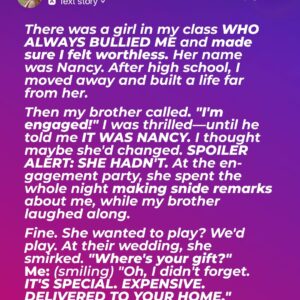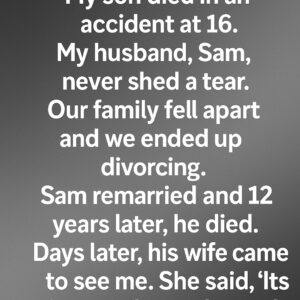Despite living apart, she’d still drop by regularly. But over the past year, something shifted. First, she said she couldn’t make it to her stepdad’s birthday dinner. Then my birthday, Christmas, Thanksgiving. Every time I invited, there was an excuse. I asked if something was wrong. She always said, “I’m just really busy,” and ended the call quickly. I couldn’t stop thinking. Was she unwell? Was her boyfriend controlling? Was she dealing with something? Then last week, we ran into each other at the store. She looked VERY uneasy. I asked her directly. And that’s when she finally admitted: “Mom, I’ve been avoiding you because I felt like you didn’t respect me when I made decisions for my life.”
I stood there, stunned. My daughter, Imelda, was looking at the floor, her cheeks red with embarrassment or maybe anger. She told me that every time she shared something about her life—like considering a career change, moving in with her boyfriend, or traveling abroad—I always found something to critique. I thought I was giving motherly advice. But she heard criticism, like I doubted her judgment or expected her to fail.
I couldn’t believe it. I felt my chest tighten with regret. I thought back on our conversations over the years. I remembered moments when she told me about her dreams, and I quickly jumped in with warnings or worst-case scenarios. I remembered one time when she said she was thinking of quitting her stable job at the dental office to try photography full time, and I blurted, “That’s not practical, you’ll regret it!” thinking I was protecting her. I never realized how much those words had stuck with her.
Standing by the frozen vegetables aisle, I tried to tell her that I only ever wanted what was best for her. But she looked me in the eye, tears threatening to spill, and said, “I know you love me, Mom. But you never really listened. You were always so afraid of what could go wrong that you didn’t hear what I wanted.”
That moment broke me. I apologized right then, but I knew words wouldn’t be enough. I asked her if she would meet me for coffee soon. She hesitated, but after a moment, she nodded. We agreed on Saturday morning.
The days leading up to Saturday were agony. I kept replaying our conversation, wondering how I’d become the kind of mom who pushed her daughter away when I thought I was protecting her. I even called my sister, Mireille, who lives three states over. She listened quietly, then said something that made my stomach drop: “Lydia, you’ve always been a worrier. But you can’t let your fears overshadow her life. She has to make mistakes to grow.”
Saturday came. I got to the café early and found a table near the window. I watched every person who came in, hoping it would be her. When Imelda finally walked through the door, I almost cried with relief. She looked nervous but determined. She ordered tea, and I got my usual black coffee.
We sat there in awkward silence for a moment. I took a deep breath and told her I wanted to hear everything—without interrupting, without offering my opinion. She looked surprised but cautiously hopeful. She started talking about how she’d been exploring freelance photography gigs, and how alive it made her feel. She described the rush of catching the perfect shot at a wedding or an outdoor engagement. She told me about nights when she’d stay up editing photos, excited to send them to her clients.
As she spoke, I realized how bright her eyes were, how animated her hands became. I thought of all the times I might have dimmed that light with my worries. I didn’t say anything, just nodded and listened. At one point, she paused and asked, “Aren’t you going to tell me why it’s a bad idea?” I smiled and said, “No, sweetheart. I’m just proud of you.”
She let out a shaky laugh, like she’d been holding her breath for months. That’s when I knew we were starting to rebuild something precious. But our conversation wasn’t all light. She admitted that she’d nearly blocked my number at one point because every call felt like a lecture. She confessed she’d started lying about being busy because it was easier than arguing.
It hurt to hear those words, but I was grateful for her honesty. I asked her if she’d be willing to meet more regularly so we could work on this together. She agreed, but only if I promised to listen more and worry less. I promised.
Over the next few months, we kept meeting every other weekend. We tried new brunch spots, visited art galleries, and sometimes just walked through the park. I made a conscious effort to bite my tongue when I felt the urge to “fix” her problems. Instead, I asked questions about how she felt, what she wanted, and how I could support her.
One day, she surprised me by inviting me to one of her photoshoots. It was a small backyard wedding, and she needed someone to help carry her gear. I was honored. Watching her move among the guests, capturing moments of laughter and quiet emotion, I saw a side of her I never knew—a confident, passionate woman who had truly found her calling.
But one twist came when I overheard her telling a bridesmaid that she’d nearly given up photography altogether because “my mom kept telling me I needed a steady paycheck.” Hearing those words in someone else’s backyard stung like a slap. It made me realize how close I’d come to crushing her dreams.
That night, I brought it up gently. I told her I overheard, and she nodded. She admitted she’d almost taken a boring office job just to avoid my disapproval. I hugged her and said, “From now on, I want you to chase what makes you happy. I’ll always be here to cheer you on.”
As weeks passed, I saw our relationship slowly heal. She started calling me again—not out of obligation, but because she wanted to share her victories and even her fears. I made sure to celebrate every win, big or small. When she booked her first out-of-state wedding, we popped a bottle of sparkling cider in my kitchen.
Through all this, I noticed a change in myself, too. Letting go of the need to control or predict every outcome brought me peace I didn’t know I needed. I started picking up old hobbies—gardening, baking—and even made some new friends at the local community center. I realized my life didn’t have to revolve around worry. I could be present, both for myself and for my daughter.
Then came the second twist. Imelda called one evening and asked if I’d meet her and someone special for dinner. I was curious but nervous. I arrived at the cozy Italian restaurant we’d agreed on and saw her sitting with a kind-faced woman named Farah. My daughter looked so happy, her hand resting on Farah’s. She introduced Farah as her partner.
I was surprised—I’d always thought she was dating men. But I quickly realized it didn’t matter. My daughter looked truly herself, and that was all I needed. Over dinner, we laughed, shared stories, and I welcomed Farah like family. Later that night, Imelda texted me: “Thanks for accepting us so easily. It means everything.”
That text brought tears to my eyes. It also made me reflect on how much I’d grown, too. I knew that if I’d stayed the old me—rigid, fearful—I might have lost not just my daughter but the chance to know the real her.
Six months after that dinner, Imelda and Farah invited me to their engagement celebration. Standing there among their friends, watching them dance and laugh, I felt such deep gratitude for second chances. I realized that love isn’t about control or protection; it’s about trust and letting people find their own way.
The biggest surprise of all came when they announced they were expecting a baby via IVF. They asked me if I’d like to be part of the child’s life, as an involved grandma. I hugged them both tightly, promising I’d always be there with love and support.
That day, I understood what my own mother tried to teach me but I was too stubborn to learn: the greatest gift we can give our children isn’t advice—it’s acceptance. By letting them carve their own paths, we show them they’re capable, worthy, and enough.
Looking back now, I see that what started as a painful conversation in a grocery store turned into the best thing that ever happened to us. I got my daughter back, and I found myself again. Our relationship is stronger, more open, and more loving than I could have dreamed.
If there’s one thing I’d want others to take from my story, it’s this: don’t let fear of the unknown drive a wedge between you and the people you love. Listen more than you speak. Support more than you criticize. And trust that even when life doesn’t go according to your plans, it can turn out beautifully if you let it.
Thank you for reading our journey. If this story touched you or reminded you of someone you care about, please share it and like this post—because you never know who might need a reminder that it’s never too late to rebuild love.





